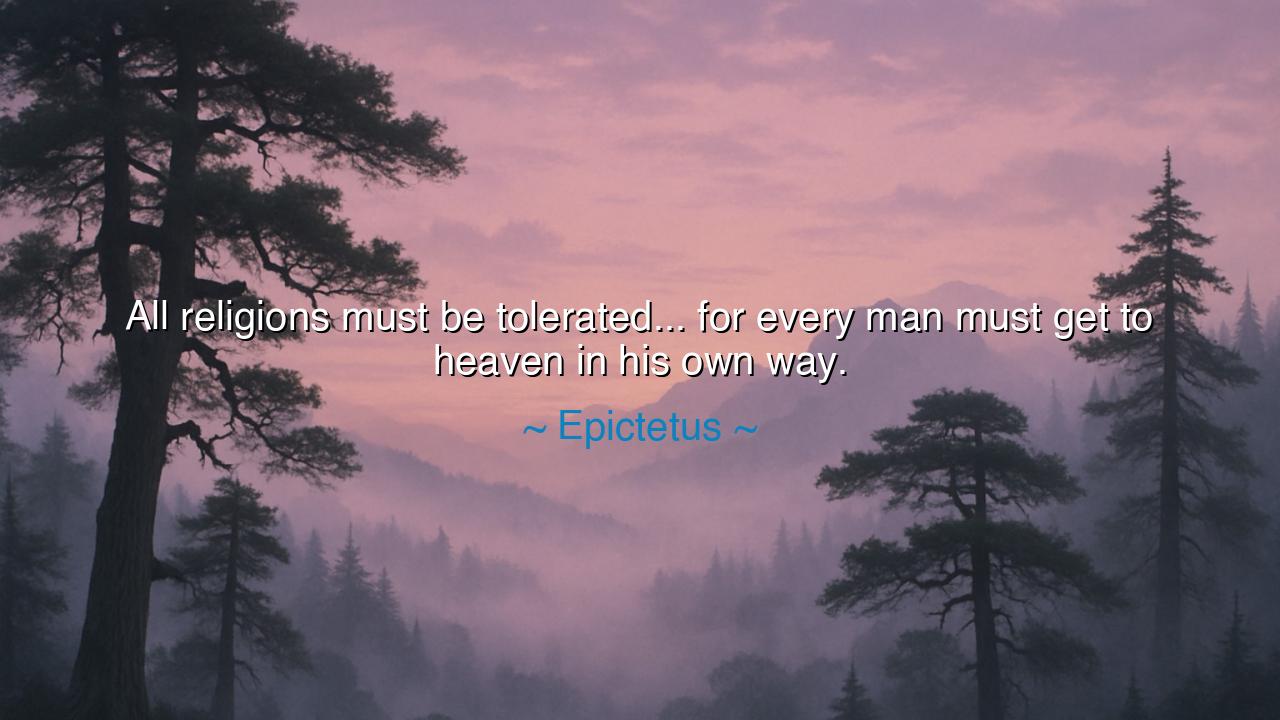
All religions must be tolerated... for every man must get to






“All religions must be tolerated... for every man must get to heaven in his own way.” — Thus taught Epictetus, the Stoic philosopher whose wisdom flowed not from luxury or privilege, but from the depths of bondage and suffering. Born a slave and rising to become one of the greatest teachers of virtue, Epictetus spoke with the authority of one who had seen the divisions and passions that tear men apart. In this timeless declaration, he reveals a truth as luminous today as it was in the ancient world: that the path to the divine is not one and narrow, but vast and many-fold — and that each soul, guided by its own light, must walk its own road toward heaven.
The origin of this quote lies in the heart of Stoic philosophy, which seeks harmony between reason, virtue, and the natural order of the universe. To Epictetus, religion was not a contest of doctrines but an expression of humanity’s longing for truth. Living in a world of competing gods and temples — Greek, Roman, Egyptian, and more — he saw that each faith, though clothed in different language and symbols, was born of the same yearning: the desire to live in accordance with the divine reason (Logos) that governs all things. His call for tolerance was not mere political courtesy; it was a spiritual necessity. For to deny another’s path is to deny the freedom of the soul itself — and no man, he believed, can find peace who tries to imprison the spirit of another.
When Epictetus says, “for every man must get to heaven in his own way,” he speaks to the dignity of human freedom — the sacred right to seek truth according to one’s own understanding. He recognized that men differ in custom, in language, in heritage, but all share the same inner spark, the same divine origin. Heaven, for him, was not a place beyond the clouds, but a state of harmony with nature, reason, and virtue. The carpenter at his work, the philosopher at his scroll, the farmer in his field — each could draw nearer to the divine through sincerity and goodness. The form mattered little; the spirit was everything.
Consider, as an example, the great Emperor Akbar of India, who centuries later embodied this very truth. Ruling over Hindus, Muslims, Christians, and Buddhists alike, Akbar declared that no single religion held a monopoly on truth. He invited scholars of every faith to his court and built the House of Worship, where all could debate and learn from one another. In an age of conquest and division, he understood what Epictetus had seen long before — that truth wears many garments, and that forcing all men to wear the same robe is tyranny, not faith. His empire did not fall because he opened his heart to difference; it flourished, nourished by tolerance and the wisdom of many streams flowing into one river.
The lesson of Epictetus is as vital now as it was in his time. Wherever men believe that their way alone leads to heaven, there arises the shadow of arrogance and the violence of division. Wars have been waged, nations destroyed, and hearts hardened in the name of the divine. But the wise know that the divine needs no defense, for truth is not a fortress to be guarded but a light to be shared. Just as one mountain may be climbed by many paths, so too the eternal can be reached by many ways. What matters is not the path itself, but the spirit with which one walks it — humility, love, and the courage to seek.
And yet, Epictetus’s teaching does not mean that all beliefs are equal in wisdom or virtue, but that all seekers are worthy of respect. He reminds us to look not at the outward ritual, but at the inward heart. A man who prays in sincerity, whether before an altar or under the open sky, is nearer to heaven than one who judges others from the steps of his temple. True religion, the Stoics taught, is the religion of character — to live justly, speak truthfully, and act kindly. Where such virtues are found, there, too, is the presence of the divine.
Therefore, dear listener, let this truth settle deeply in your soul: honor the faith of others as you honor your own. Listen not with the intent to argue, but to understand. Do not mock the prayer you do not recite, nor despise the ritual you do not practice, for beneath every form of worship beats the same human heart, longing for meaning, peace, and love. When you see your neighbor bow to the east, and another light a candle to the west, know that both are reaching toward the same sky.
This, then, is the eternal wisdom of Epictetus: that tolerance is not weakness, but strength born of understanding. To respect the many ways to heaven is not to lose faith, but to honor the vastness of the divine. For heaven cannot be conquered — it can only be approached through virtue, humility, and the harmony of the soul. So walk your path with sincerity, and let others walk theirs. For in the end, all roads that are lit by love lead to the same home — the eternal dwelling place of the spirit.






AAdministratorAdministrator
Welcome, honored guests. Please leave a comment, we will respond soon